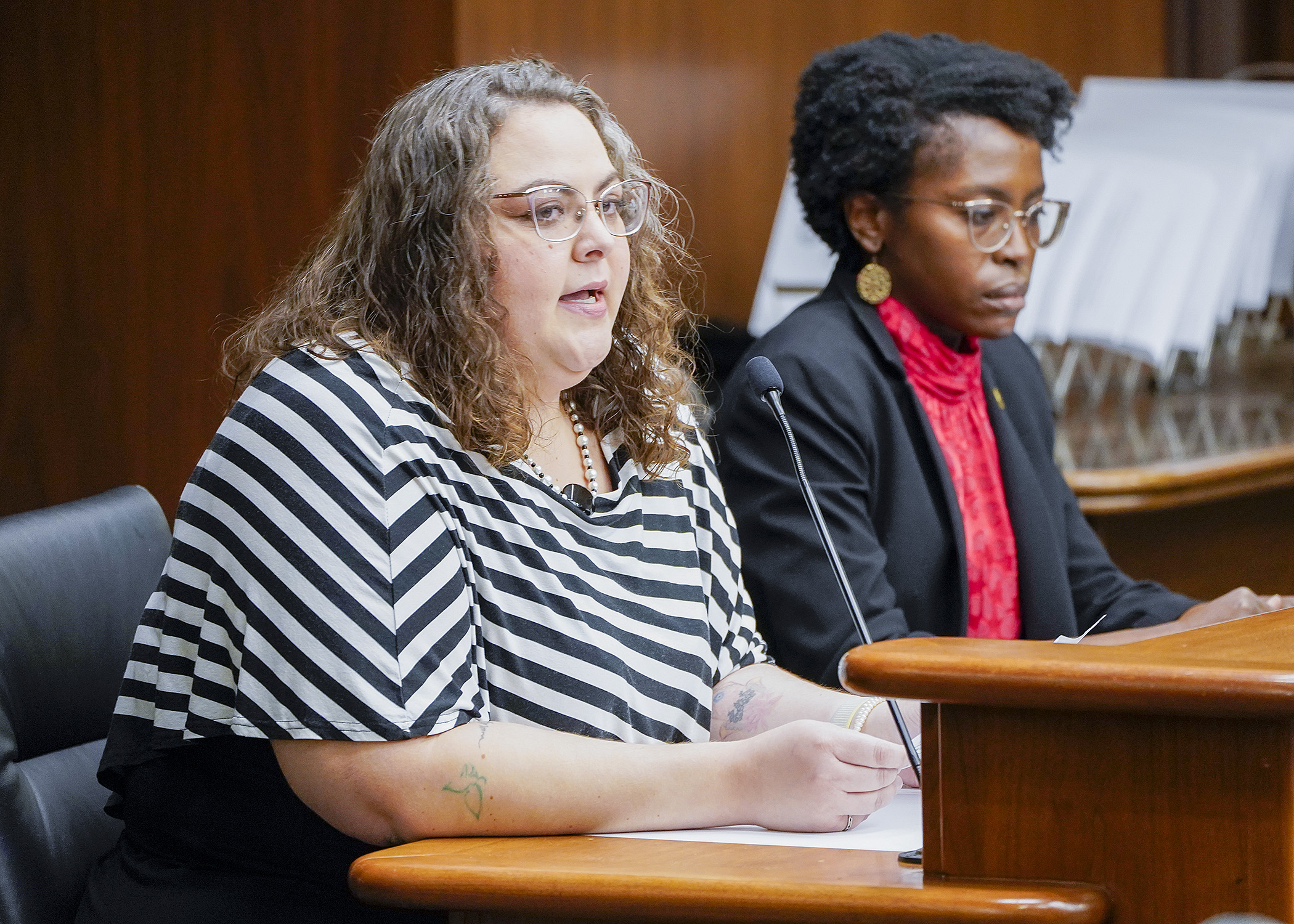Housing omnibus bill could overhaul tenant, landlord law

Renters comprise up to 30% of households across the state, and in our most populous cities that number can be 50% of households or more.
All could be affected by the omnibus housing policy bill.
To balance the power dynamics between landlords and renters, Rep. Esther Agbaje (DFL-Mpls) sponsors HF917, which would update provisions on tenant’s rights, lease terminations, evictions and eviction expungements.
“It also outlines the best practices that many of our landlords are already implementing with their tenants,” she said.
On an 8-4 party-line vote, the House Housing Finance and Policy Committee approved the bill Tuesday after adopting a delete-all amendment, which itself was amended. It’s next stop is the House Judiciary Finance and Civil Law Committee.
Much of the bill focuses on tenants’ rights, including changes that would:
- prohibit rental assistance discrimination;
- bar landlords from requiring pet declawing or devocalization;
- require landlords to disclose fees, and forbid fees unless for a service provided by the landlord;
- create a four-month waiting period after move-in before a landlord may ask the tenant about lease renewals, which applies only to leases longer than 10 months;
- demand the lease renewal question occur no sooner than six months before the end of a lease in Minneapolis, St. Paul, Rochester and Duluth;
- establish potential landlord liability for monetary damages to a tenant if they failed to complete an initial or final inspection;
- restrict landlord entry into residential units by requiring a 24-hour notice before entry and limiting arrival to only the hours between 8 a.m. and 8 p.m.;
- alter penalties for improper entry to no less than one month’s rent and attorney fees, as opposed to current law’s $100 penalty; and
- establish a right to counsel for residents of public housing facing eviction for holding over the property or alleged illegal activities in the unit.
One supporter stood up for source of income protections as a foundational housing right for renters, particularly those in marginalized groups.
As we know, Minnesota holds the shameful distinction of having some of the largest racial and economic disparities in the country, said Ivory Taylor, associate director at Housing Justice Center. “This legacy is made abundantly clear in the way our current housing system works for renters in Minnesota.”
Numerous others opposed the provision prohibiting rental assistance discrimination.
Leanna Stefaniak, vice chair for the Minnesota Multi Housing Association, calls it a “mandatory Section 8 proposal” for property managers and housing providers.
“HF917 makes it a discriminatory practice if the landlord does not participate in the program. This refusal is not a discriminatory act against the participant, rather it’s a refusal to participate in a federal program.”
Instead, she suggests a light touch option that would encourage landlords to participate in the Section 8 voucher program through government-funded incentives.
Eviction changes
The eviction procedure for nonpayment of rent would be altered, including allowing a government agency to assist with redemption of a unit. Before bringing an eviction action alleging nonpayment or other unpaid financial obligation respective to the lease, a landlord would need to provide written 14-day notice to a tenant specifying the basis for the eviction. Options for notifying a tenant of an eviction action could now include phone calls, texts and emails.
Additionally, the bill could provide a new procedure for the summons in an eviction action, which includes a notice for how to get legal and financial assistance.
Lastly, discretionary expungement for evictions may be amended, eviction case filings would need to remain confidential until after the case has been decided, and winning an eviction case, among other actions, would result in a mandatory expungement.
Other elements of the bill include:
- heat be provided to tenants at a minimum temperature of 68 degrees from Oct. 1 to April 30;
- specifying the type of incidents that could allow a tenant to petition for emergency repairs and allow tenants to petition for emergency relief to fix such repairs, which a landlord could be court-ordered to remedy;
- for tenants without a written lease, notice of termination of lease would move from 14 days to the interval between the time rent is due; and
- upon infirmity, a tenant would be allowed to terminate their lease.
The following are bills that have been incorporated in part or in whole into the omnibus housing policy bill:
Related Articles
Search Session Daily
Advanced Search OptionsPriority Dailies
Speaker Emerita Melissa Hortman, husband killed in attack
By HPIS Staff House Speaker Emerita Melissa Hortman (DFL-Brooklyn Park) and her husband, Mark, were fatally shot in their home early Saturday morning.
Gov. Tim Walz announced the news dur...
House Speaker Emerita Melissa Hortman (DFL-Brooklyn Park) and her husband, Mark, were fatally shot in their home early Saturday morning.
Gov. Tim Walz announced the news dur...
Lawmakers deliver budget bills to governor's desk in one-day special session
By Mike Cook About that talk of needing all 21 hours left in a legislative day to complete a special session?
House members were more than up to the challenge Monday. Beginning at 10 a.m...
About that talk of needing all 21 hours left in a legislative day to complete a special session?
House members were more than up to the challenge Monday. Beginning at 10 a.m...